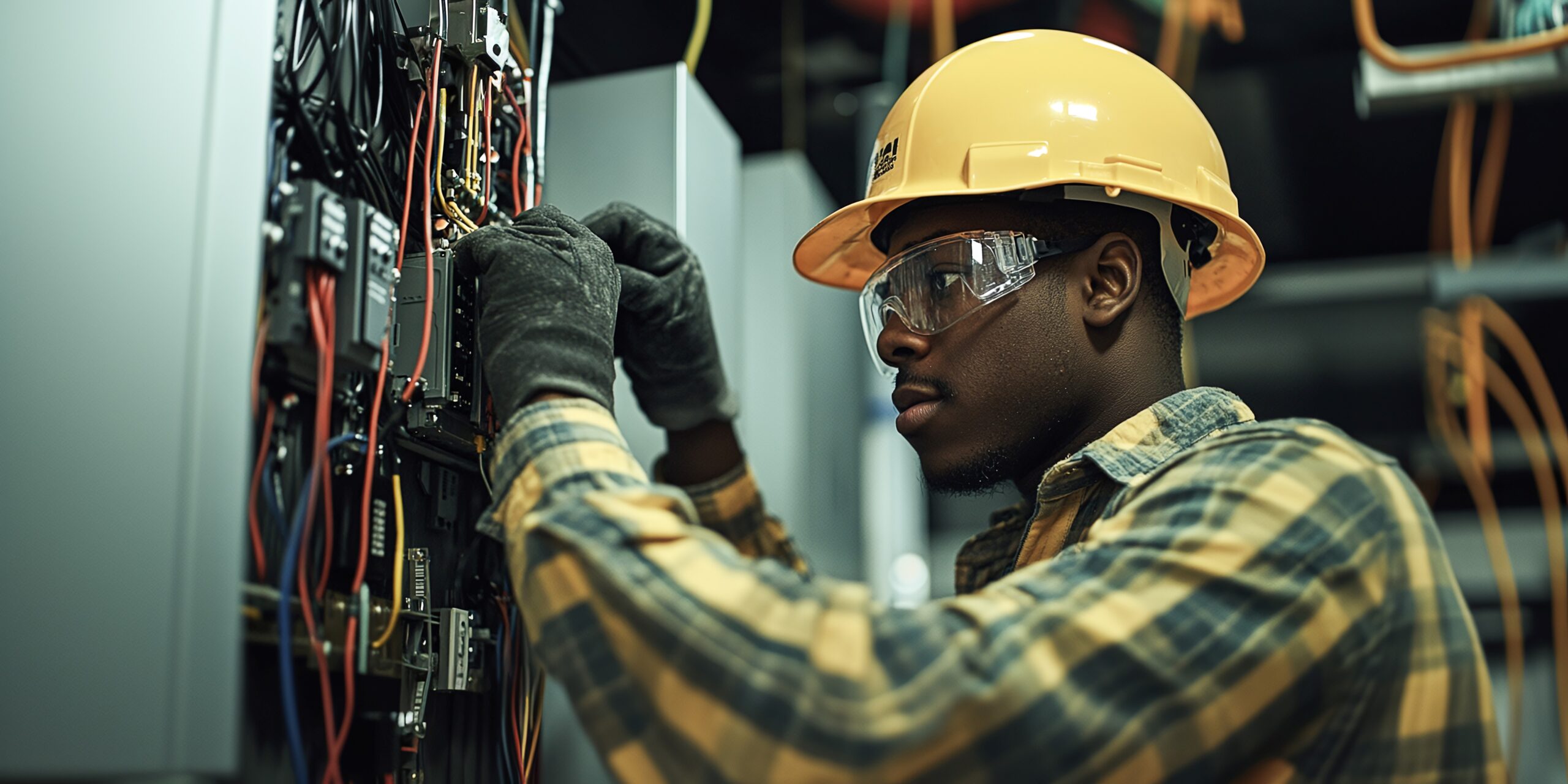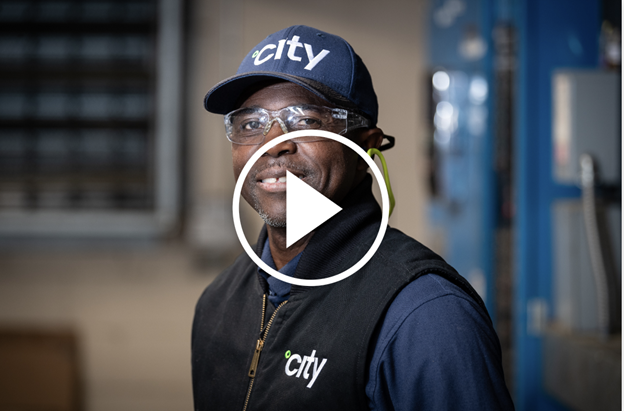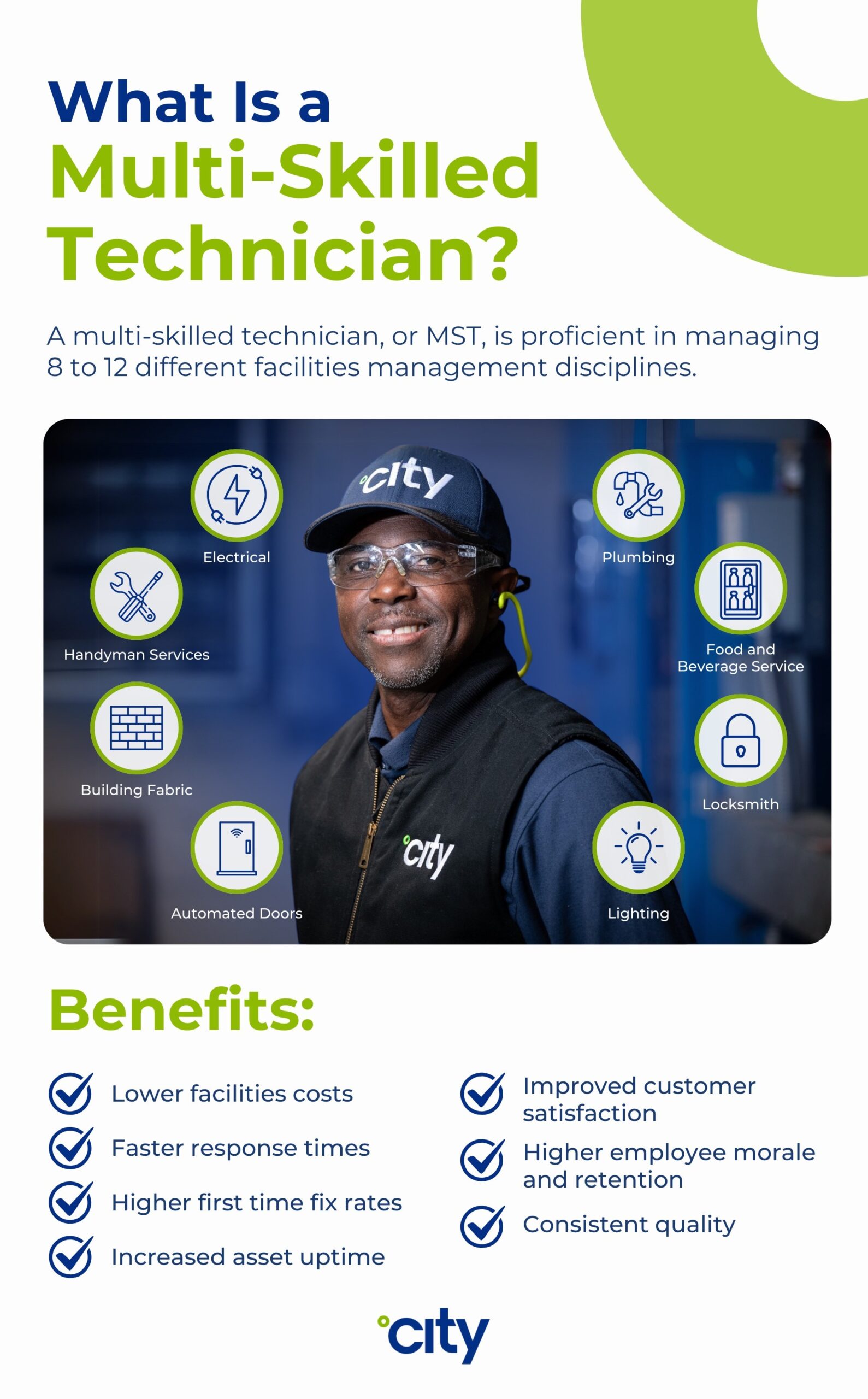
Skilled tradesmen are the lifeblood of retail stores, especially when it comes to supermarkets and facilities that rely heavily on refrigeration and other critical equipment. However, with rising facilities costs, advancing technology demands, and an increasing shortage of skilled labor, skilled tradespeople are evolving –- into multi-skilled technicians, or MSTs.
Evidence shows that facilities management leaders can cut costs and boost workforce reliability by training technicians across multiple disciplines to create multi-skilled tradesmen. An MST is proficient in several trades, offering a cost-saving advantage that can decrease total facilities management costs by 10 to 20%, minimizing expenses related to multiple vendor service calls while also ensuring faster response times.
As George Campbell, Director of Technical Services at City US, explains, “Multi-skilled technicians are essential in today’s facilities environment. With labor shortages and operational costs at an all-time high, having a dedicated MST provides invaluable efficiency and reliability.”
Multi-skilled technicians are essential in today’s facilities environment. With labor shortages and operational costs at an all-time high, having a dedicated MST provides invaluable efficiency and reliability.George Campbell, Director of Technical Services at City US
This is especially relevant as the HVAC/R industry faces a critical shortage of skilled commercial refrigeration technicians, with about 80,000 unfilled positions representing 39% of the workforce.
In this article, we’ll compare the role of traditional skilled tradesmen with the emerging multi-skilled technician and examine how this shift can help facilities achieve greater operational efficiency and cost savings.
What Are Skilled Tradesmen?
Before exploring the new multi-skilled tradesman model, let’s look at the traditional skilled tradesman role that facilities teams depend on.
What Is a Skilled Tradesman?
A skilled tradesman refers to a technician who specializes in a particular trade, such as electrical, HVAC, plumbing, carpentry, or refrigeration. They undergo specialized training, usually through apprenticeship programs or trade schools, to become proficient in the skills and knowledge required for their specific trade.
What Is a Skilled Trade?
A skilled trade is an occupation that requires manual dexterity, technical aptitude, and specialized knowledge rather than academic or professional training. Skilled trades play an integral facilities role including functions such as equipment installation, maintenance, and repair.
What Does a Skilled Tradesman Do?
A skilled tradesman handles a single trade area for a facilities team. Their daily work involves the installation, preventive maintenance, troubleshooting, and repair of systems and equipment related to their specialization. For example, an HVAC technician focuses exclusively on heating, ventilation, and air conditioning systems.
While skilled tradesmen play a vital part in facilities operations, relying solely on single-discipline technicians poses limitations. Forward-thinking facilities leaders are showing an increased interest in developing multi-skilled technicians to drive greater value.
What Is a Multi-Skilled Tradesman?
A multi-skilled tradesman is a technician trained across multiple disciplines, giving them a wider range of capabilities compared to traditional single-trade technicians.
As George explains, “Multi-skilled technicians are the future of facilities management best practices. Cross-training allows technicians to handle a variety of systems and equipment, increasing their value exponentially.”
An MST can perform numerous trades critical for retail maintenance and operations:
- Electrical: Handling store wiring, lighting, generators, motors, and power distribution systems
- Mechanical: Repairing and maintaining equipment like HVAC systems, refrigeration, kitchen appliances, and plumbing
- Lighting: Installing, replacing, and repairing all types of interior and exterior lighting fixtures
- Plumbing: Addressing leaks, drain/sewer issues, water heaters, fixtures, and piping
- Carpentry: Repairing structural damage, installing fixtures, and performing finish work
- Handyman services: Tackling minor repairs like shelving, painting, and furniture assembly
- Building fabric: Managing walls, roofs, windows, floors, and weather sealing
- Automated doors: Installing, adjusting, and fixing automated entrance/exit doors
- Food and beverage: Maintaining and repairing kitchen equipment, soda fountains, and coffee makers
- Locksmithing: Handling access control systems, door hardware, keys and locks
With such versatile capabilities, MSTs can resolve nearly any facilities need both quickly and comprehensively. Watch this video to learn more:
Benefits of Multi-Skilled Tradesmen
Transitioning to an MST model offers facilities teams greater efficiency, reliability, and cost savings, among other benefits:
- Lower expenses: Instead of multiple vendors charging for labor, travel, parts, etc., one MST can tackle most issues in a single visit. This consolidation significantly reduces costs.
- Faster response: With expertise across disciplines, MSTs can quickly identify and address a wider range of problems without waiting for additional technicians.
- Higher first-time fix rates: MSTs’ broad skill set allows them to resolve issues faster and reduces the need for callbacks.
- Increased asset uptime: With proactive maintenance and faster, more reliable repairs, MSTs maximize the time equipment and systems are up and running.
- Improved customer satisfaction: With equipment running smoothly and no interruptions to service, customers have better experiences.
- Enhanced productivity: Cross-training allows for better allocation of labor during fluctuations in workload and technician availability.
- Improved morale and retention: Advancement and skill development opportunities keep technicians engaged and reduce turnover.
- Easier recruiting: MST roles are more attractive to potential hires given their greater compensation potential and opportunities for skill development.
- Consistent quality: In-house MSTs ensure reliable, high-quality work overtime, avoiding the inconsistencies that can come with multiple outside vendors.
Training Multi-Skilled Technicians
Developing multi-skilled technicians requires a commitment to ongoing skill development and training across various trades. Hands-on learning using real-world equipment, like the training provided by First Coast Technical Academy, is essential. Retailers must be prepared to invest resources into creating these comprehensive training programs or consider outsourcing the development. However, facilities teams will find that the return on investment makes the effort well worth it.
Realize the Potential of Multi-Skilled Teams
Transitioning to a multi-skilled technician model requires foresight and dedication but ultimately pays dividends through enhanced efficiencies and reliability. As part of City’s industry-leading IFM solution, our skilled MSTs tackle over 90% of facilities management needs for our grocery and convenience store partners. Learn more about our Integrated Facilities Management services today.




 2016: City US is established in North America, in partnership with Southeastern Grocers (SEG), servicing over 750 supermarkets across 7 southern states.
2016: City US is established in North America, in partnership with Southeastern Grocers (SEG), servicing over 750 supermarkets across 7 southern states. 1985: Willie and Susan Haughey establish City Refrigeration Holdings (UK) Ltd in Glasgow, UK.
1985: Willie and Susan Haughey establish City Refrigeration Holdings (UK) Ltd in Glasgow, UK. 2009: City Australia launches in Melbourne, in partnership with Coles, servicing over 700 supermarkets across the country.
2009: City Australia launches in Melbourne, in partnership with Coles, servicing over 700 supermarkets across the country. 2015: City Asia launches in Kuala Lumpur, Malaysia, in partnership with Dairy Farm, servicing over 205 supermarkets across the region.
2015: City Asia launches in Kuala Lumpur, Malaysia, in partnership with Dairy Farm, servicing over 205 supermarkets across the region.